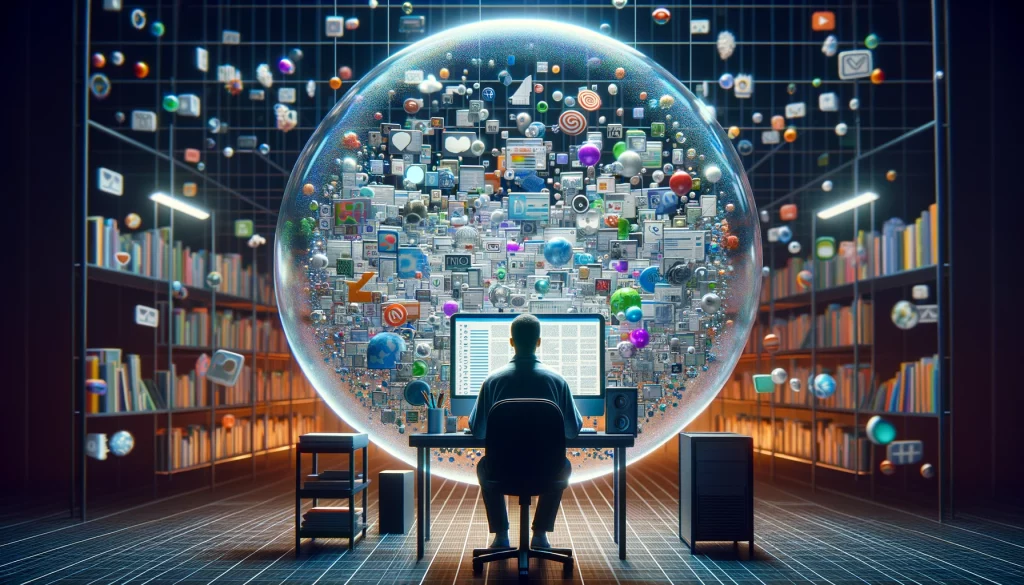The concept of a “confirmation loop” in psychology is a critical element to understand in the contexts of media literacy, disinformation, and political ideologies. It operates on the basic human tendency to seek out, interpret, favor, and recall information in a way that confirms one’s preexisting beliefs or hypotheses, known as confirmation bias. This bias is a type of cognitive bias and a systematic error of inductive reasoning that affects the decisions and judgments that people make.
Understanding the confirmation loop
A confirmation loop occurs when confirmation bias is reinforced in a cyclical manner, often exacerbated by the selective exposure to information that aligns with one’s existing beliefs. In the digital age, this is particularly prevalent due to the echo chambers created by online social networks and personalized content algorithms.
These technologies tend to present us with information that aligns with our existing views, thus creating a loop where our beliefs are constantly confirmed, and alternative viewpoints are rarely encountered. This can solidify and deepen convictions, making individuals more susceptible to disinformation and conspiracy theories, and less tolerant of opposing viewpoints.
Media literacy and disinformation
Media literacy is the ability to identify different types of media and understand the messages they’re sending. It’s crucial in breaking the confirmation loop as it involves critically evaluating sources of information, their purposes, and their impacts on our thoughts and beliefs.
With the rise of digital media, individuals are bombarded with an overwhelming amount of information, making it challenging to distinguish between credible information and disinformation. It is paramount to find your own set of credible sources, and verify the ethics and integrity of new sources you come across.
Disinformation, or false information deliberately spread to deceive people, thrives in an environment where confirmation loops are strong. Individuals trapped in confirmation loops are more likely to accept information that aligns with their preexisting beliefs without scrutinizing its credibility. This makes disinformation a powerful tool in manipulating public opinion, especially in politically charged environments.
Political ideologies
The impact of confirmation loops on political ideologies cannot be overstated. Political beliefs are deeply held and can significantly influence how information is perceived and processed.
When individuals only consume media that aligns with their political beliefs, they’re in a confirmation loop that can reinforce partisan views and deepen divides. This is particularly concerning in democratic societies where informed and diverse opinions are essential for healthy political discourse.
Operation of the confirmation loop
The operation of the confirmation loop can be seen in various everyday situations. For instance, a person might exclusively watch news channels that reflect their political leanings, follow like-minded individuals on social media, and participate in online forums that share their viewpoints.
Algorithms on many platforms like Facebook and Twitter (X) detect these preferences and continue to feed similar content, thus reinforcing the loop. Over time, this can result in a narrowed perspective, where alternative viewpoints are not just ignored but may also be actively discredited or mocked.
Becoming more aware and breaking the loop
Becoming more aware of confirmation loops and working to break them is essential for fostering open-mindedness and reducing susceptibility to disinformation. Here are several strategies to achieve this:
- Diversify Information Sources: Actively seek out and engage with credible sources of information that offer differing viewpoints. This can help broaden your perspective and challenge your preconceived notions.
- Critical Thinking: Develop critical thinking skills to analyze and question the information you encounter. Look for evidence, check sources, and consider the purpose and potential biases behind the information.
- Media Literacy Education: Invest time in learning about media literacy. Understanding how media is created, its various forms, and its impact can help you navigate information more effectively.
- Reflect on Biases: Regularly reflect on your own biases and consider how they might be affecting your interpretation of information. Self-awareness is a crucial step in mitigating the impact of confirmation loops.
- Engage in Constructive Dialogue: Engage in respectful and constructive dialogues with individuals who hold different viewpoints. This can expose you to new perspectives and reduce the polarization exacerbated by confirmation loops.
The confirmation loop is a powerful psychological phenomenon that plays a significant role in shaping our beliefs and perceptions, especially in the context of media literacy, disinformation, and political ideologies. By understanding how it operates and actively working to mitigate its effects, individuals can become more informed, open-minded, and resilient against disinformation.
The path toward breaking the confirmation loop involves a conscious effort to engage with diverse information sources, practice critical thinking, and foster an environment of open and respectful discourse.
